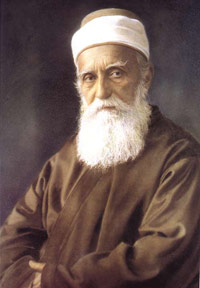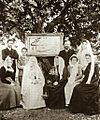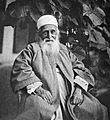`Abdu'l-Bahá facts for kids
| Creators | |
|
Bahá'u'lláh |
|
| Important Books | |
| Aqdas · Kitáb-i-Íqán The Hidden Words |
|
| Leaders and Councils | |
|
Administrative Order |
|
| History | |
|
Bahá'í history · Timeline |
|
| Famous Members | |
|
Shoghi Effendi |
|
| Extra | |
|
Symbols · Laws |
`Abdu'l-Bahá was an important leader of the Bahá'í Faith. He was born in Persia (modern-day Iran) on May 23, 1844. His father, Bahá'u'lláh, founded the Bahá'í Faith. `Abdu'l-Bahá's life was often difficult because of his father's new religion. He spent many years in prison or under house arrest.
Bahá'u'lláh chose `Abdu'l-Bahá to be the only person who could truly explain his teachings. He called him the "Expounder" of his words. This was very important. It stopped different groups from forming and arguing about what Bahá'u'lláh meant. This helped keep the Bahá'í Faith united.
Contents
Early Life and Challenges
`Abdu'l-Bahá was born in Tehran, Persia. His birth happened on the same night that the Báb, an important figure in the Bahá'í Faith, declared his mission. `Abdu'l-Bahá was given the name `Abbás. As a child, he lived a comfortable life. However, this changed when his father, Bahá'u'lláh, faced persecution.
When `Abdu'l-Bahá was eight years old, his father was arrested. Their family's home was taken away. They lost all their money and belongings. Soon after, Bahá'u'lláh was exiled from Persia. This meant he was forced to leave his home country. `Abdu'l-Bahá and his family went with him.
Their first exile was to Baghdad, which is now in Iraq. Life there was very hard. They faced poverty and danger. `Abdu'l-Bahá helped his family as much as he could. He was very devoted to his father. He learned a lot by listening to his father's discussions.
Years of Imprisonment
The family was exiled several more times. They moved from Baghdad to Constantinople (now Istanbul, Turkey). Then they went to Adrianople (now Edirne, Turkey). Finally, they were sent to Akká, a prison city in what is now Israel. They arrived in Akká in 1868.
`Abdu'l-Bahá spent 40 years of his life as a prisoner. He was often under house arrest. This meant he could not leave the city of Akká. Despite these challenges, he worked hard to serve his father. He managed the family's affairs. He also helped other Bahá'ís who were imprisoned with them.
During this time, `Abdu'l-Bahá became known for his kindness. He helped the poor and sick people in Akká. He was respected by everyone, even those who were not Bahá'ís. He showed great patience and strength.
Leading the Bahá'í Faith
When Bahá'u'lláh passed away in 1892, `Abdu'l-Bahá became the leader of the Bahá'í Faith. This was a very important role. He was responsible for guiding the growing community. He also had to explain his father's teachings to the world.
`Abdu'l-Bahá continued to live in Akká. He received many visitors from all over the world. People came to learn about the Bahá'í Faith. They were inspired by his wisdom and love. He taught that all people are one family. He also taught about the importance of peace and justice.
In 1908, `Abdu'l-Bahá was finally freed from prison. This was because of a political change in the Ottoman Empire. He was then able to travel freely.
Travels and Teachings
After his release, `Abdu'l-Bahá traveled widely. He visited Egypt, Europe, and North America. His goal was to spread the message of the Bahá'í Faith. He spoke to many different groups of people. He met with leaders, thinkers, and ordinary citizens.
During his travels, `Abdu'l-Bahá emphasized several key ideas:
- Unity of Humankind: He taught that all people are equal. He said that differences in race or background should not divide us.
- Equality of Men and Women: He believed that men and women are like two wings of a bird. Both are needed for humanity to fly forward.
- Harmony of Science and Religion: He explained that true science and true religion cannot contradict each other. They both come from the same truth.
- World Peace: He spoke about the need for a global government. This government would help solve problems between countries peacefully.
- Independent Investigation of Truth: He encouraged everyone to search for truth for themselves. People should not just follow what others believe.
His travels were very successful. Many people were inspired by his message. The Bahá'í Faith began to grow in new countries.
Later Life and Legacy
`Abdu'l-Bahá returned to Akká in 1913. He continued to guide the Bahá'í community. During World War I, he helped the people of Akká. He organized farming projects to provide food. He made sure that no one in the city starved.
For his humanitarian efforts during the war, he received an honor from the British government. He was made a Knight Commander of the Order of the British Empire in 1920.
`Abdu'l-Bahá passed away on November 28, 1921, in Haifa, Israel. His funeral was attended by thousands of people. They came from many different religions and backgrounds. This showed how much he was loved and respected by everyone.
`Abdu'l-Bahá's life was an example of service and devotion. He showed how to live by the Bahá'í teachings. He helped establish the Bahá'í Faith around the world. His writings and talks continue to inspire millions today.
Images for kids
-
Early Western Baháʼí pilgrims. Standing left to right: Charles Mason Remey, Sigurd Russell, Edward Getsinger and Laura Clifford Barney; Seated left to right: Ethel Jenner Rosenberg, Madam Jackson, Shoghi Effendi, Helen Ellis Cole, Lua Getsinger, Emogene Hoagg
-
ʻAbdu'l-Bahá at his investiture ceremony as a Knight Commander of the Order of the British Empire, April 1920
-
Funeral of ʻAbdu'l-Bahá in Haifa, British Mandate-Palestine
See also
 In Spanish: `Abdu'l-Bahá para niños
In Spanish: `Abdu'l-Bahá para niños
 | Jackie Robinson |
 | Jack Johnson |
 | Althea Gibson |
 | Arthur Ashe |
 | Muhammad Ali |












